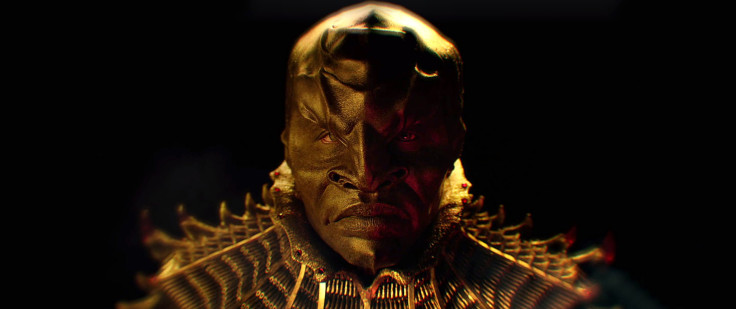While there are many reasons to be skeptical of the upcoming Star Trek: Discovery (consider CBS dumbing down fired showrunner Bryan Fuller’s “heavily allegorical and complex story line” a smoking gun), the show’s treatment of Klingons doesn’t look to be one of them.
Discovery ’s new Klingons are ritualistic, steeped in tradition, religious and profoundly alien in a way previous iterations never have been. Plus, they’ve got cool, spiky armor. And like every television show taking after Game of Thrones, Star Trek: Discovery looks to delve into the complicated politics between the 24 Great Houses of the Klingon High Council. But the most important figure will be T’Kuvma, who hopes to reunite the Klingons under a single banner, appealing to tradition with ancient ceremonies and heightening tension with Starfleet to manufacture a common enemy. The latest teaser trailer features T’Kuvma explaining his motive.
We must fight for one thing above all: to remain Klingon. https://t.co/zyUNS2I9Af #StarTrekDiscovery pic.twitter.com/gviA8SP8co
— Star Trek on Paramount+ (@StarTrekOnPPlus) August 25, 2017
It’s pure Klingon identity politics. “We must fight for one thing, above all: to remain Klingon.”
This single line attests to the obvious influence of Star Trek II: The Wrath of Khan and Star Trek VI: The Undiscovered Country writer and director Nicholas Meyer, a consulting producer on Star Trek: Discoveryj. Meyer perfected Klingons as a metaphor for the Soviet Union, effectively mirroring and presaging its collapse — The Undiscovered Country came out in theaters 20 days before the government’s official dissolution.
At 2016’s Star Trek Mission New York, Meyer revealed the evolution of his thinking on the Klingons as metaphors for real-world political conflict, imagining Klingons retooled as identitarian extremists. “Whether we’re talking about ISIS or whether we’re talking about Donald Trump, these are things in the air. New demagogues arise. And what do you do with an enemy who is implacable, who is not interesting in negotiations?” Meyers said. “These are tough questions. And our series will do a disservice if it doesn’t honestly address these things.”
Hence the pivot to Klingon identity politics, presenting a realigned and rare perspective on a class of politics often pejoratively associated with progressives. In Language and Politics, linguist and leftist activist Noam Chomsky argues that the right uses labels like “identity politics” to divide common interest groups, using the preferred buzzword of earlier decades, “special interests”:
“In both the 1980 and 1984 elections, they identified the Democrats as ‘the party of special interests,’ and that’s supposed to be bad, because we’re all against the special interests. But if you look closely and ask who were the special interests, they listed them: women, poor people, workers, young people, old people, ethnic minorities — in fact, the entire population. There was only one group that was not listed among the special interests: corporations.”
Appeals to specific identities, economic classes and outlooks are rife in politics, dramatized in an unorthodox way in the new Discovery trailer. “They are coming,” T’Kuvma says in the teaser, invoking an unnamed they and the threat they represent to the Klingon identity, “atom by atom, they will silence us.” This is identity politics at work. Rather than exclusively existing among populist movements denigrated by donor class propaganda, T’Kuvma demonstrates the universality of identity politics in his militant plan to consolidate power over the Klingon Empire. (And he does it all in spiffy gold armor)
T’Kuvma’s identity politics represent one of the most interesting ways Discovery thoughtfully reinvented the United Federation of Planet’s oldest foes and most unlikely allies, reemphasizing the alienness and danger of the Klingon honor culture that had slowly drifted into barroom tall tales and adorable drunken loutishness over 14 seasons of Star Trek: The Next Generation and Deep Space Nine. All my love to Worf, Martok, Gowron and the Duras sisters, but something had to change if Discovery was determined to return to the warring days before the Khitomer Accords.
- Richly redesigned Klingons
- Complex and explicable motives
- Great new Starfleet characters
- Incredible production design
- Generic space combat and action
- Too many flashbacks
- Eschews subtext, doesn't put enough faith in the audience















![[EG April 19] Best 'Stardew Valley' Mods That Will Change](https://d.player.one/en/full/226012/eg-april-19-best-stardew-valley-mods-that-will-change.png?w=380&h=275&f=955520b8313253ee3c39c791f6210f38)



